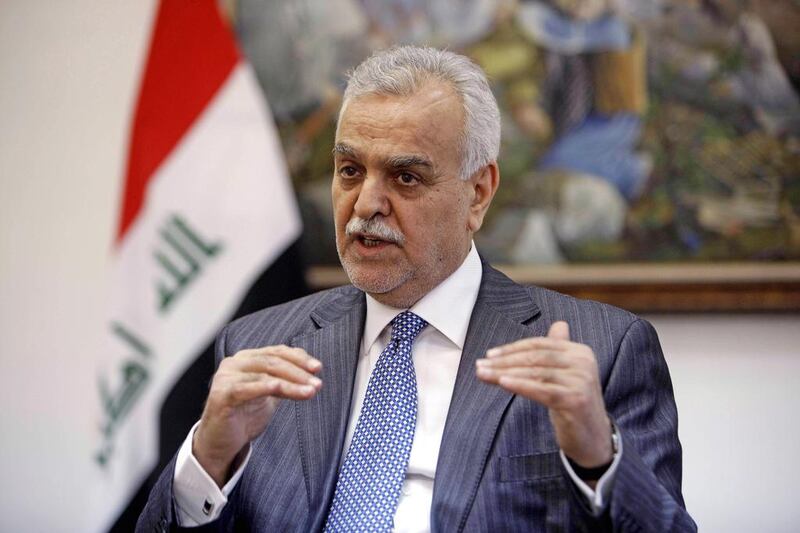Istanbul // Without a change in government, Iraq’s Sunni population could grow to sympathise with militants from the Islamic State, the country’s fugitive vice president says.
Tariq Al Hashemi fled Iraq in 2012 after being accused of running a Sunni death squad, a charge he denies. He found refuge in Turkey and was later sentenced to death in absentia by an Iraqi court.
Speaking to The National by phone, Mr Al Hashemi insisted that the crisis gripping Iraq would only grow worse if prime minister Nouri Al Maliki returned for a third term as premier.
“Voting for Maliki is a vote for splitting Iraq,” he said, commenting on the efforts to form a new government in Baghdad. “This gentleman has been the main cause of the instability.”
Mr Al Hashemi said Mr Al Maliki and his Shiite-dominated government enjoyed no support from Arab Sunnis, Kurds, nor “maybe 60 or 70 per cent of the Shia”.
If it were up to Iraqis, the country might find a way to avert a political meltdown and sectarian war, he said. But with Iran’s influence dominating Iraq, compromise appears unlikely as Tehran seems to prefer having Mr Al Maliki retain power for the time being.
“Iran now considers Iraq as part of its empire. I don’t know how the Shia, the Sunni and the Kurds can find common ground. The Shia elites are now becoming a puppet of Iran,” Mr Al Hashemi said.
The Sunni politician also stressed that the wider international community shared the blame for Iraq’s descent into chaos. Human rights organisations have documented the deterioration of human rights during Mr Al Maliki’s time in power, he said, “but all those countries that invaded my country in 2003 and talked about respecting human rights, transparency and democratic values, which Iraqis accepted, they did not follow up”.
Mr Al Hashemi, who raised eyebrows last month when he called the Islamic State’s capture of Mosul, Iraq’s second city, “a revolution”, reiterated that the extremists, known to execute their opponents and punish those who fall foul of their rules with flogging, amputation and crucifixion, was only the most visible of the Sunni militant groups fighting Mr Al Maliki.
“They are only one part of the spectrum in this revolution”, though “also the most influential”, he said.
Once Mr Al Maliki is out of the way and Sunnis regain a voice in national politics, they will shake off extremist groups such as Islamic State, Mr Al Hashemi said.
“The Iraqi people have grown up on moderation and tolerance and coexistence,” he said. “And I can assure everybody that if the international community helps Iraqis establish a real state, with functioning institutions and justice, there will be no hope and no future for extremism.”
If the outside world is genuinely committed to Iraq’s stability, he added, it should stop focusing on the Islamic State alone and tackle Shiite extremism as well.
“It is one of the eye-catching double standards of the western countries,” he said. “They’re focusing on Sunni terrorism, but there is also Shia terrorism. Shia militias in Baghdad are kidnapping and killing hundreds of innocent people.”
If there is not an overhaul of the governing structure and a more balanced approach by the West, he said, moderate Sunnis are in danger of falling into the Islamic State’s arms.
“Over the past eight years, we lost hope and democracy in the political process because of the inhuman situation that my people are living in, because of the widespread corruption, because of the loss of opportunities for improving living standards and services,” he said.
“If we lose hope in the political process, what is left? What is left is extremism.”
In 2008, Mr Al Hashemi said, he and other Sunni leaders helped wean thousands of young Iraqis from Al Qaeda, part of what was called the “Sunni awakening”. Having assured them a better future, Mr Al Hashemi said, he failed to live up to his promise.
“What did I leave them? Now Maliki has penalised the tribes in Fallujah and Ramadi, he has used armed force against them, the same tribes who fought Al Qaeda in 2008, who cleared Al Qaeda from Anbar. Is this the reward they were promised?”
What has surprised Mr Al Hashemi about the current crisis is not Mr Al Maliki’s actions. It is the response, or lack thereof, from western powers.
“Regardless of his mischiefs, the international community is supporting him, and now the United States is sending him 300 military advisers, drones to kill more Sunni people, and F-16s and helicopters and rockets are on the table.
“If they are doing this, then I can assure you that all of the Sunni community is going to be part of ISIS agenda,” he said, referring to Islamic State by an acronym of its former name.
“You are going to lose, we are going to lose.”
foreign.desk@thenational.ae





